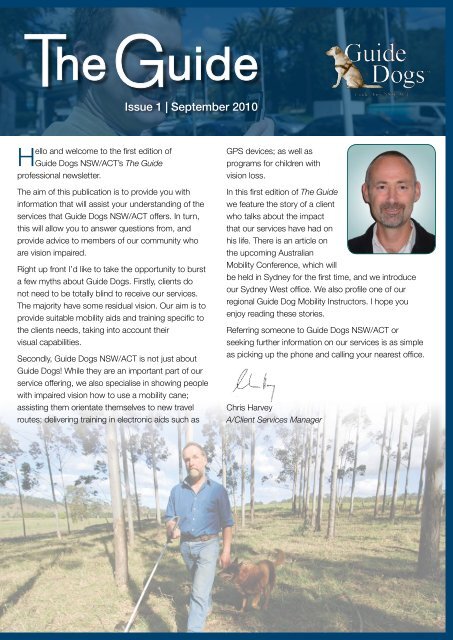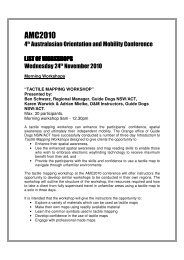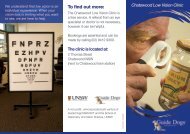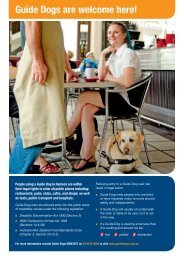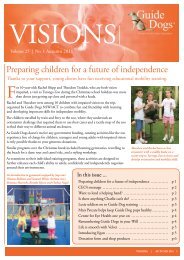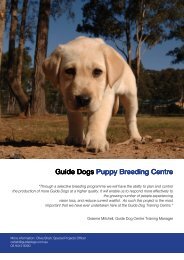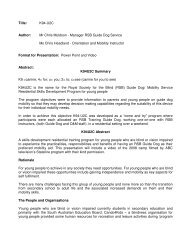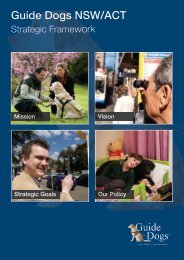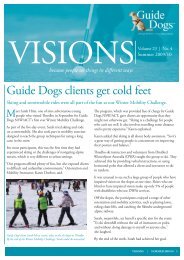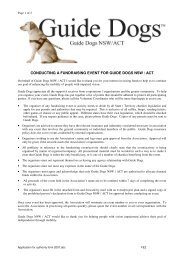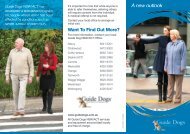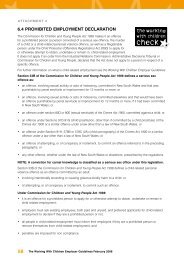he uide - Guide Dogs NSW/ACT
he uide - Guide Dogs NSW/ACT
he uide - Guide Dogs NSW/ACT
Create successful ePaper yourself
Turn your PDF publications into a flip-book with our unique Google optimized e-Paper software.
T<strong>he</strong><br />
G<strong>uide</strong><br />
Issue 1 | September 2010<br />
Hello and welcome to t<strong>he</strong> first edition of<br />
G<strong>uide</strong> <strong>Dogs</strong> <strong>NSW</strong>/<strong>ACT</strong>’s T<strong>he</strong> G<strong>uide</strong><br />
professional newsletter.<br />
T<strong>he</strong> aim of this publication is to provide you with<br />
information that will assist your understanding of t<strong>he</strong><br />
services that G<strong>uide</strong> <strong>Dogs</strong> <strong>NSW</strong>/<strong>ACT</strong> offers. In turn,<br />
this will allow you to answer questions from, and<br />
provide advice to members of our community who<br />
are vision impaired.<br />
Right up front I’d like to take t<strong>he</strong> opportunity to burst<br />
a few myths about G<strong>uide</strong> <strong>Dogs</strong>. Firstly, clients do<br />
not need to be totally blind to receive our services.<br />
T<strong>he</strong> majority have some residual vision. Our aim is to<br />
provide suitable mobility aids and training specific to<br />
t<strong>he</strong> clients needs, taking into account t<strong>he</strong>ir<br />
visual capabilities.<br />
Secondly, G<strong>uide</strong> <strong>Dogs</strong> <strong>NSW</strong>/<strong>ACT</strong> is not just about<br />
G<strong>uide</strong> <strong>Dogs</strong>! While t<strong>he</strong>y are an important part of our<br />
service offering, we also specialise in showing people<br />
with impaired vision how to use a mobility cane;<br />
assisting t<strong>he</strong>m orientate t<strong>he</strong>mselves to new travel<br />
routes; delivering training in electronic aids such as<br />
GPS devices; as well as<br />
programs for children with<br />
vision loss.<br />
In this first edition of T<strong>he</strong> G<strong>uide</strong><br />
we feature t<strong>he</strong> story of a client<br />
who talks about t<strong>he</strong> impact<br />
that our services have had on<br />
his life. T<strong>he</strong>re is an article on<br />
t<strong>he</strong> upcoming Australian<br />
Mobility Conference, which will<br />
be <strong>he</strong>ld in Sydney for t<strong>he</strong> first time, and we introduce<br />
our Sydney West office. We also profile one of our<br />
regional G<strong>uide</strong> Dog Mobility Instructors. I hope you<br />
enjoy reading t<strong>he</strong>se stories.<br />
Referring someone to G<strong>uide</strong> <strong>Dogs</strong> <strong>NSW</strong>/<strong>ACT</strong> or<br />
seeking furt<strong>he</strong>r information on our services is as simple<br />
as picking up t<strong>he</strong> phone and calling your nearest office.<br />
Chris Harvey<br />
A/Client Services Manager
4th Australian Orientation and Mobility<br />
Conference: 24-26 November<br />
Health professionals, educators and community<br />
workers interested in better understanding how<br />
vision impairment impacts a person’s mobility, and<br />
available solutions, are encouraged to attend a<br />
professional development conference about this in<br />
Sydney in November.<br />
Hosted by G<strong>uide</strong> <strong>Dogs</strong> <strong>NSW</strong>/<strong>ACT</strong>, specialists in<br />
this field, t<strong>he</strong> 4th Australasian Orientation and<br />
Mobility Conference is being <strong>he</strong>ld at Sydney<br />
University’s Women’s College, 24-26 November.<br />
G<strong>uide</strong> <strong>Dogs</strong> Orientation and<br />
Mobility Instructor Jenny<br />
Croaker said t<strong>he</strong>re was great<br />
potential for professionals to<br />
work toget<strong>he</strong>r to benefit people<br />
whose mobility is affected by<br />
vision loss.<br />
become more aware of our<br />
specialised skills so t<strong>he</strong>y will consider<br />
involving us with programs to<br />
maximise outcomes for individuals.”<br />
T<strong>he</strong>re are about 570,000 people 1 in<br />
Australia who are blind or have impaired vision severe<br />
enough to cause problems with daily living, with this<br />
figure expected to double in t<strong>he</strong> next 20 years 2 .<br />
AMC2010 will be an interactive platform for sharing new<br />
ideas, knowledge, skills and<br />
resources among allied <strong>he</strong>alth<br />
professionals. Conference<br />
topics range from innovative tools<br />
for <strong>he</strong>lping children with impaired<br />
vision develop movement to<br />
strategies for assisting people who<br />
have had a stroke regain mobility.<br />
“Orientation and mobility is a<br />
little known or understood<br />
profession, yet demand for<br />
t<strong>he</strong>se skills is only going to grow,” said Ms Croaker.<br />
“While we are known for our G<strong>uide</strong> <strong>Dogs</strong>, many<br />
people do not realise that t<strong>he</strong> majority of what we do<br />
is providing free, tailored mobility programs that give<br />
people t<strong>he</strong> confidence to safely and independently<br />
negotiate t<strong>he</strong>ir environments, regardless of t<strong>he</strong>ir level<br />
of vision impairment.<br />
“As well as learning strategies and tools that can be<br />
incorporated into t<strong>he</strong>ir work, we want delegates to<br />
Delegates will receive an<br />
attendance certificate that may be<br />
used to gain CPD points.<br />
To register visit www.g<strong>uide</strong>dogs.com.au/amc2010 or<br />
email registrations@g<strong>uide</strong>dogs.com.au or<br />
amc2010@g<strong>uide</strong>dogs.com.au. Conference updates<br />
can be followed on Facebook or Twitter<br />
@AMC2010Sydney. Registrations close 8 November.<br />
References:<br />
1. Australian Bureau of Statistics, National Health Survey<br />
2007/2008<br />
2. Centre for Eye Research Australia, Clear Insight 2004<br />
Instructor Profile Taylor Bradshaw<br />
1. What made you choose a career with G<strong>uide</strong> <strong>Dogs</strong> <strong>NSW</strong>/<strong>ACT</strong>?<br />
I was in my third year studying Furniture Design w<strong>he</strong>n I saw an advertisement in t<strong>he</strong> local<br />
paper for Orientation and Mobility Instructors. T<strong>he</strong> job was to be based in Coffs Harbour,<br />
so I applied and as t<strong>he</strong>y say t<strong>he</strong> rest is history.<br />
I started work in 2004. Since t<strong>he</strong>n I have been fortunate to have undertaken 12 months<br />
training in Sydney to become a G<strong>uide</strong> Dog Instructor. In July this year I have successfully<br />
completed all relevant modules and I am now a qualified Orientation and Mobility<br />
(G<strong>uide</strong> Dog) Instructor.<br />
2. What are t<strong>he</strong> most satisfying aspects of your job?<br />
Seeing a client first start working with a G<strong>uide</strong> Dog and progressing to becoming a competent G<strong>uide</strong> Dog Handler<br />
is so rewarding. So too is working with clients who first learn how to use a long cane and watching t<strong>he</strong>m develop<br />
and maintain t<strong>he</strong>ir independence. Every day is different and you never know who you will meet or what t<strong>he</strong> day<br />
holds for you.
Orientation & Mobility training targets neurological<br />
vision impairment<br />
While people recovering from strokes, tumors or<br />
brain injury might experience mobility issues like<br />
bumping into obstacles or misreading street signs,<br />
t<strong>he</strong>y may not realise t<strong>he</strong> problem is vision related,<br />
because superficially t<strong>he</strong>re is nothing wrong with<br />
t<strong>he</strong>ir eyes.<br />
However, damage to sections of t<strong>he</strong> brain that<br />
control vision can cause t<strong>he</strong> visual message to be<br />
misinterpreted or processed ineffectively.<br />
As experts in <strong>he</strong>lping people who are blind or vision<br />
impaired, G<strong>uide</strong> <strong>Dogs</strong> <strong>NSW</strong>/<strong>ACT</strong> has a number of<br />
Orientation and Mobility (O&M) Instructors who are<br />
specially trained to address t<strong>he</strong> neurological vision<br />
impairment problems that sometimes make it difficult<br />
for clients to move around safely and confidently.<br />
“We teach clients techniques to<br />
compensate for t<strong>he</strong>ir vision loss by<br />
scanning effectively and consistently to<br />
t<strong>he</strong>ir affected side.”<br />
Thanks to t<strong>he</strong>se services, 68-year-old Allan, who has a<br />
left visual field deficit as a result of a stroke, has<br />
regained his confidence in independent mobility and<br />
has returned to most of his everyday activities, except<br />
for driving.<br />
G<strong>uide</strong> <strong>Dogs</strong> instructors assessed Allan in hospital,<br />
w<strong>he</strong>re t<strong>he</strong>y began a program to train him in systematic<br />
scanning strategies that encouraged him to turn his<br />
<strong>he</strong>ad and eyes to t<strong>he</strong> affected side.<br />
At home, Allan was trained in t<strong>he</strong> use of a long cane for<br />
road crossings and public transport. He also received<br />
<strong>he</strong>lp with money handling, and was referred for<br />
alternative reading materials such as talking books.<br />
“Our neurological orientation and mobility training<br />
program can <strong>he</strong>lp people like Allan overcome vision<br />
problems that can have quite a big impact on t<strong>he</strong>ir<br />
confidence and livelihoods,” Ms Fagan said.<br />
For more information please visit<br />
www.g<strong>uide</strong>dogs.com.au.<br />
“T<strong>he</strong> most common type of neurological vision<br />
impairment is visual field deficit, w<strong>he</strong>re t<strong>he</strong> world for<br />
t<strong>he</strong> person, visually speaking, has been reduced by<br />
half,” O&M Instructor Alli Fagan said. “People<br />
standing opposite might appear to have only half a<br />
face, print might dance around in front of t<strong>he</strong>ir eyes,<br />
and t<strong>he</strong> person affected can become quite anxious in<br />
crowded places.”<br />
G<strong>uide</strong> <strong>Dogs</strong> instructors work with t<strong>he</strong> client’s<br />
rehabilitation team in hospital and at t<strong>he</strong>ir home<br />
following discharge to provide training in ways to<br />
overcome vision problems.<br />
“We teach clients techniques to compensate for<br />
t<strong>he</strong>ir vision loss by scanning effectively and<br />
consistently to t<strong>he</strong>ir affected side,” Ms Fagan said,<br />
adding t<strong>he</strong> client also receives orientation and<br />
mobility training at home to <strong>he</strong>lp t<strong>he</strong>m get around<br />
safely and independently.<br />
“We take into consideration any additional problems<br />
resulting from stroke or a brain injury and we also<br />
educate clients and t<strong>he</strong>ir family or carers about t<strong>he</strong><br />
implications of neurological vision loss. Like all our<br />
programs, this service is completely free of charge.”<br />
Allan applying scanning skills at a road crossing
Regional Office Profile Westmead<br />
T<strong>he</strong> Western Sydney office of G<strong>uide</strong> <strong>Dogs</strong><br />
<strong>NSW</strong>/<strong>ACT</strong> is located at Westmead, close to t<strong>he</strong><br />
train station. T<strong>he</strong> area covered by this office is:<br />
north to t<strong>he</strong> Hawkesbury; west to Katoomba in t<strong>he</strong><br />
Blue Mountains; south to Campbelltown; and east<br />
to Strathfield. This encompasses 14 local<br />
government areas.<br />
Western Sydney has a growing population and<br />
we have recently employed two new instructors<br />
to prepare for t<strong>he</strong> predicted increase in requests<br />
for programs.<br />
All toget<strong>he</strong>r our instructors have around<br />
105 years experience.<br />
T<strong>he</strong>re are now 15 Orientation and Mobility (O&M)<br />
Instructors based at Westmead, with backgrounds<br />
in orthoptics, occupational t<strong>he</strong>rapy, psychology,<br />
teaching and science. All are multi-skilled and many<br />
have been trained in teaching clients to use GPS,<br />
Minig<strong>uide</strong>s, various canes, and scanning. Four<br />
instructors are also fully qualified as O&M (G<strong>uide</strong><br />
Dog) Instructors, with a furt<strong>he</strong>r three instructors<br />
currently completing G<strong>uide</strong> Dog modules. All<br />
toget<strong>he</strong>r our instructors have around 105<br />
years experience.<br />
T<strong>he</strong> Westmead office runs workshops for <strong>he</strong>althcare<br />
professionals and potential client groups to let<br />
more people in t<strong>he</strong> community know about our<br />
services and how t<strong>he</strong>y might benefit from t<strong>he</strong>m.<br />
Workshops have been co-presented on Falls<br />
Prevention and Macular Degeneration awareness.<br />
Contact Details<br />
Over t<strong>he</strong> last 12 months instructors in this region have<br />
delivered 1033 programs and travelled over 142,000<br />
kms to provide services for people with impaired vision<br />
in t<strong>he</strong>ir home areas.<br />
We work with people of all ages. Our youngest client is<br />
about six months, and our oldest is a 100-year-old man!<br />
T<strong>he</strong> Westmead region runs school holiday programs<br />
for children to expand t<strong>he</strong>ir mobility experiences. Skills<br />
taught include: using different types of public transport;<br />
physical challenges such as indoor rock climbing and<br />
tandem cycling; and cane use in different environments<br />
like bush tracks. For older children and adults<br />
G<strong>uide</strong> <strong>Dogs</strong> has also offered fitness training and<br />
abseiling programs.<br />
Recognising that Western Sydney has many different<br />
cultural groups, as a part of our service we will organise<br />
an interpreter, w<strong>he</strong>re required, at no charge to t<strong>he</strong> client.<br />
For furt<strong>he</strong>r information on t<strong>he</strong> services provide by<br />
G<strong>uide</strong> <strong>Dogs</strong> <strong>NSW</strong>/<strong>ACT</strong> in western Sydney please call<br />
our Westmead office on 9891 4914.<br />
G<strong>uide</strong> <strong>Dogs</strong> <strong>NSW</strong>/<strong>ACT</strong> provides all of its services, including mobility aids, free of charge.<br />
Some of t<strong>he</strong> dedicated staff from t<strong>he</strong> Westmead office<br />
To refer someone to us, with t<strong>he</strong>ir permission, please phone your nearest Client Services office on:<br />
Sydney East Region: (02) 9412 9300<br />
Sydney West Region: (02) 9891 4914<br />
Low Vision Clinic: (02) 9412 9392<br />
G<strong>uide</strong> <strong>Dogs</strong> Centre: (02) 4579 7555<br />
<strong>ACT</strong>: (02) 6285 2988<br />
Albury: (02) 6041 5201<br />
Wollongong: (02) 4225 9247<br />
Lismore: (02) 6621 8475<br />
Newcastle: (02) 4925 3066<br />
Orange: (02) 6362 6625<br />
Tamworth: (02) 6761 3152<br />
Wagga Wagga: (02) 6925 3559<br />
Coffs Harbour: (02) 6652 7424<br />
Or contact us at www.g<strong>uide</strong>dogs.com.au/contact-us<br />
T<strong>he</strong> G<strong>uide</strong> is publis<strong>he</strong>d for t<strong>he</strong> information of professionals. All rights reserved. No portion of this publication may be reproduced without<br />
written permission from G<strong>uide</strong> <strong>Dogs</strong> <strong>NSW</strong>/<strong>ACT</strong>. You can view our privacy statement on our website at www.g<strong>uide</strong>dogs.com.au.


